人教版八年级下册 Unit8 Have you read treasure Island yet?SectionA Grammar focus 4a-4c 课件(共30张PPT)
文档属性
| 名称 | 人教版八年级下册 Unit8 Have you read treasure Island yet?SectionA Grammar focus 4a-4c 课件(共30张PPT) |
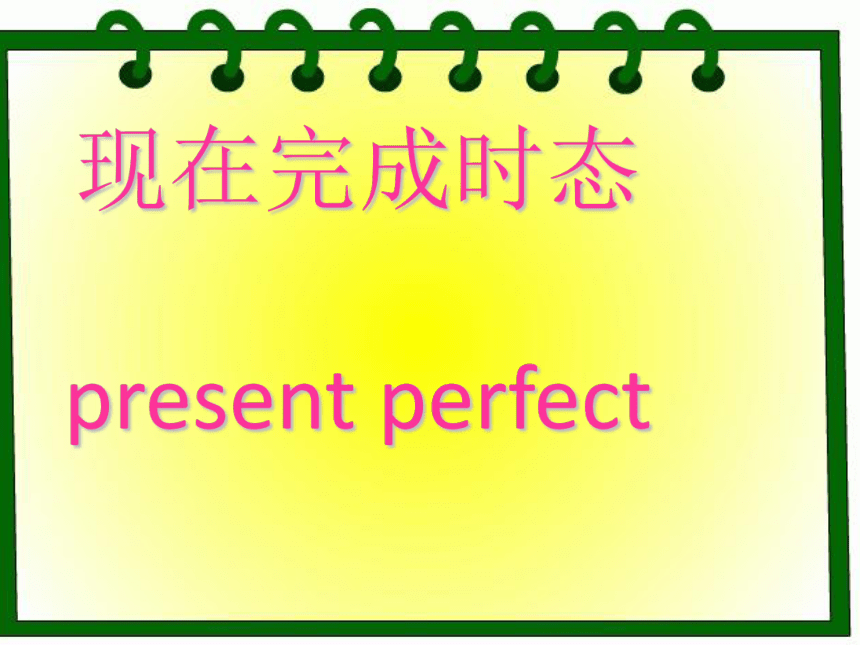
|
|
| 格式 | ppt | ||
| 文件大小 | 466.0KB | ||
| 资源类型 | 教案 | ||
| 版本资源 | 人教新目标(Go for it)版 | ||
| 科目 | 英语 | ||
| 更新时间 | 2023-03-19 00:00:00 | ||
图片预览


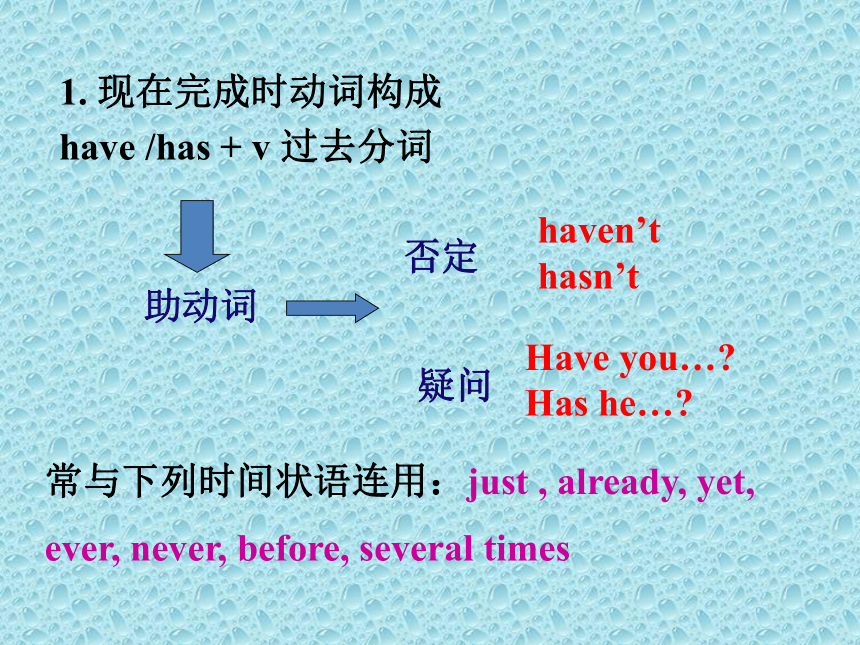

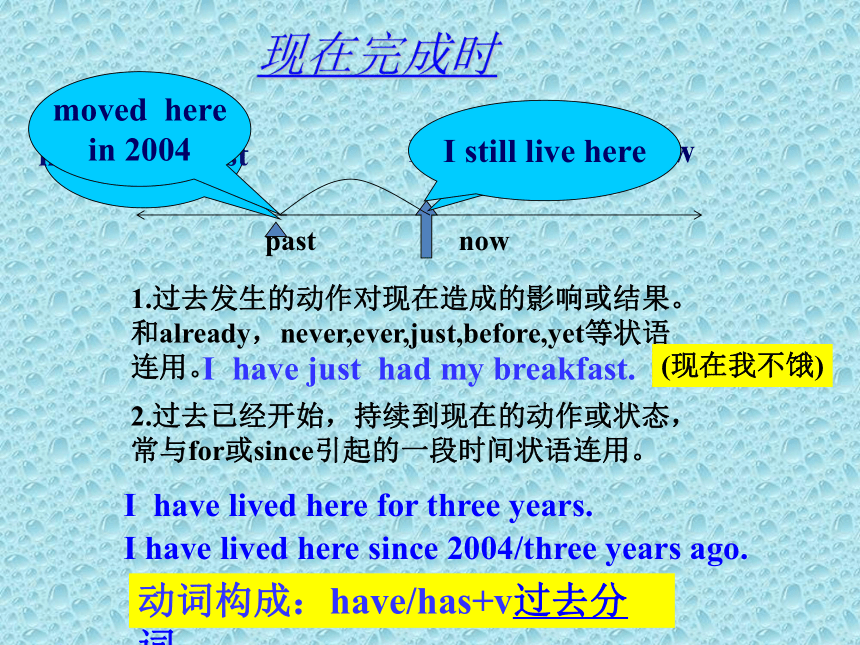
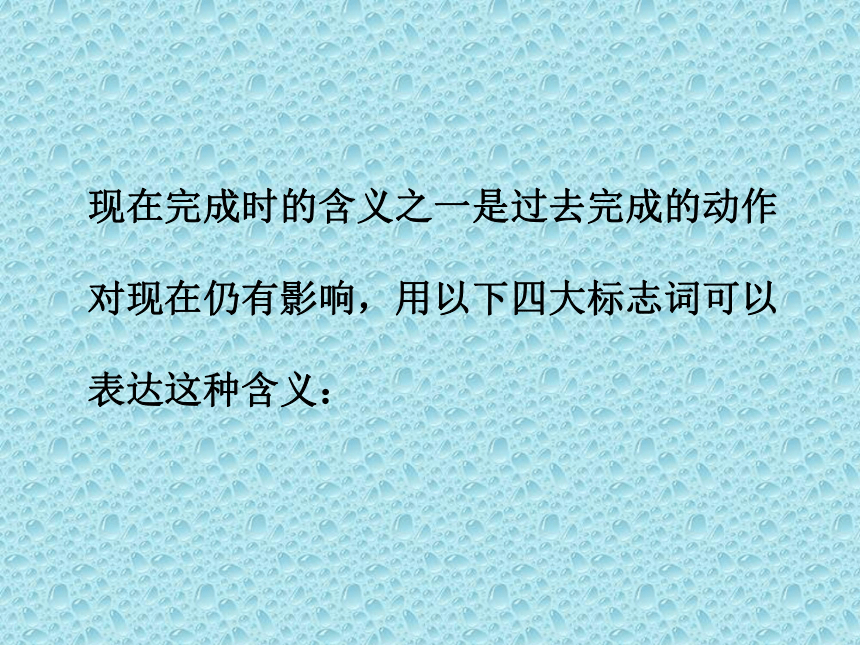
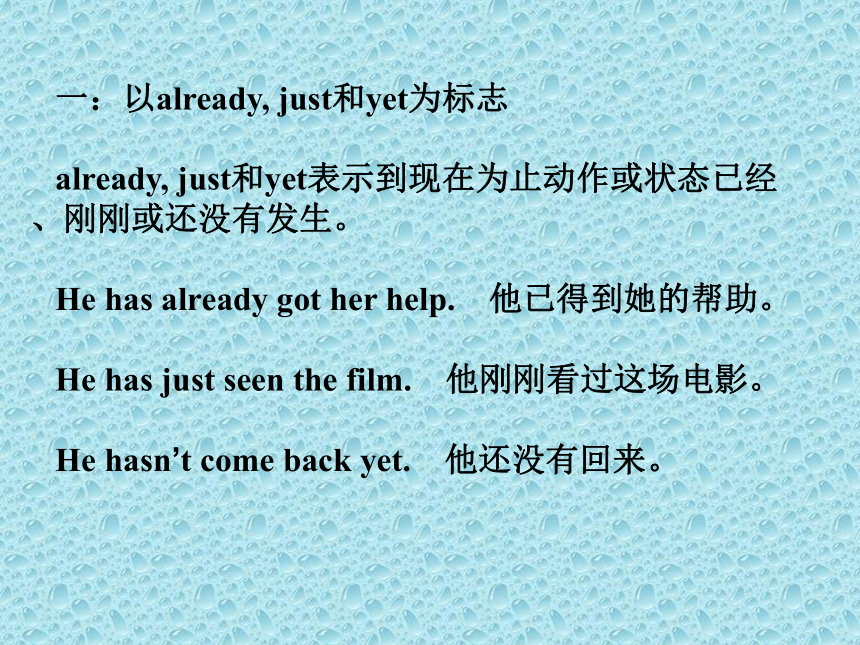

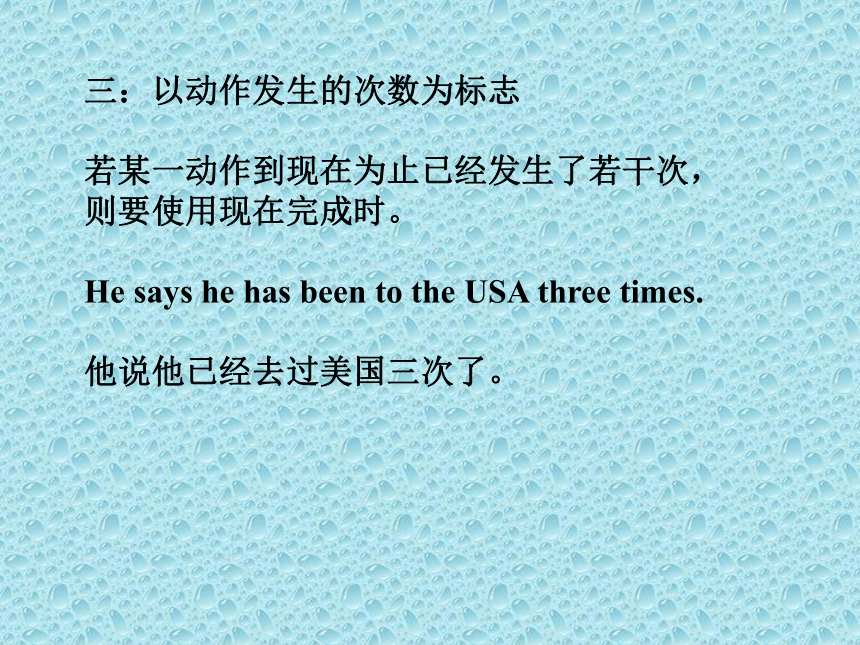
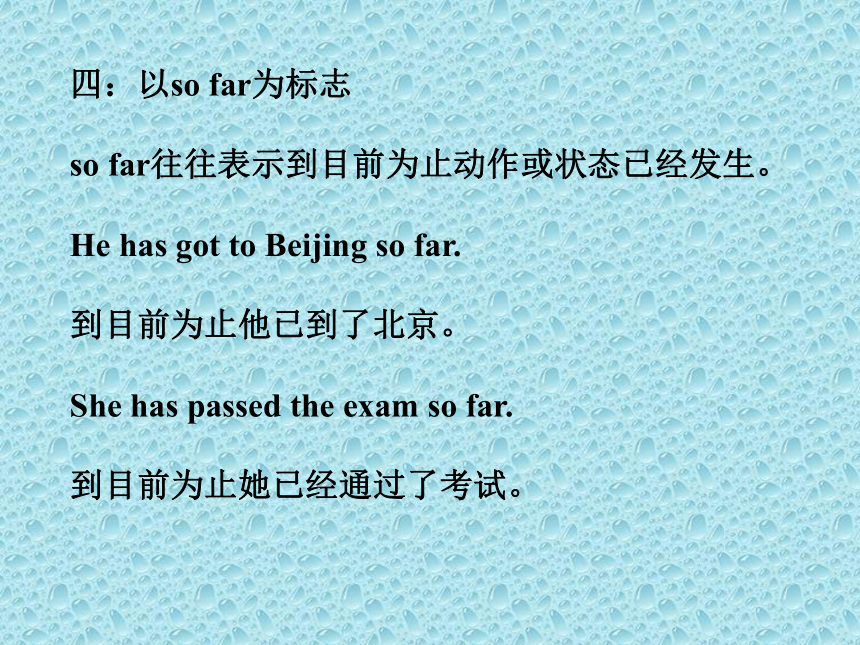
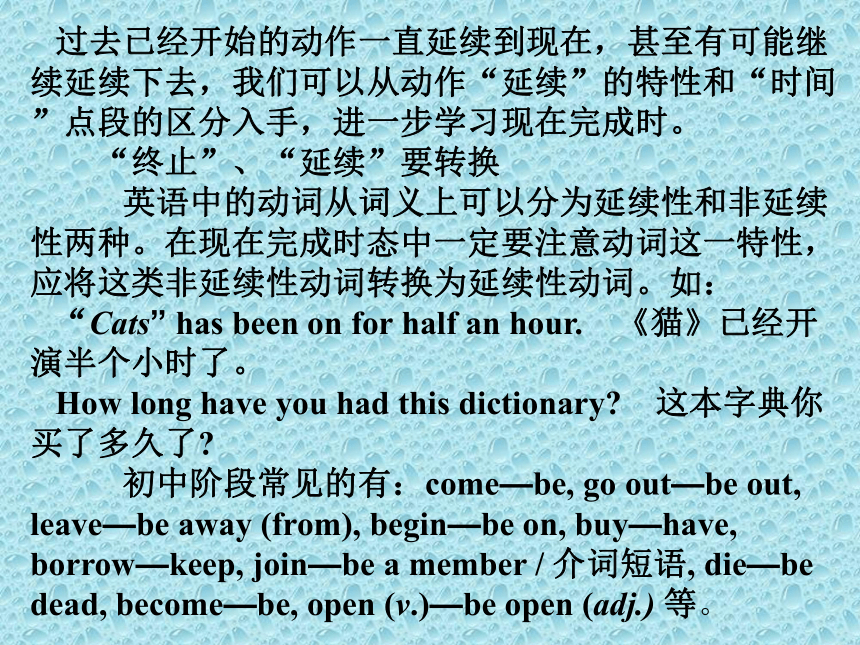
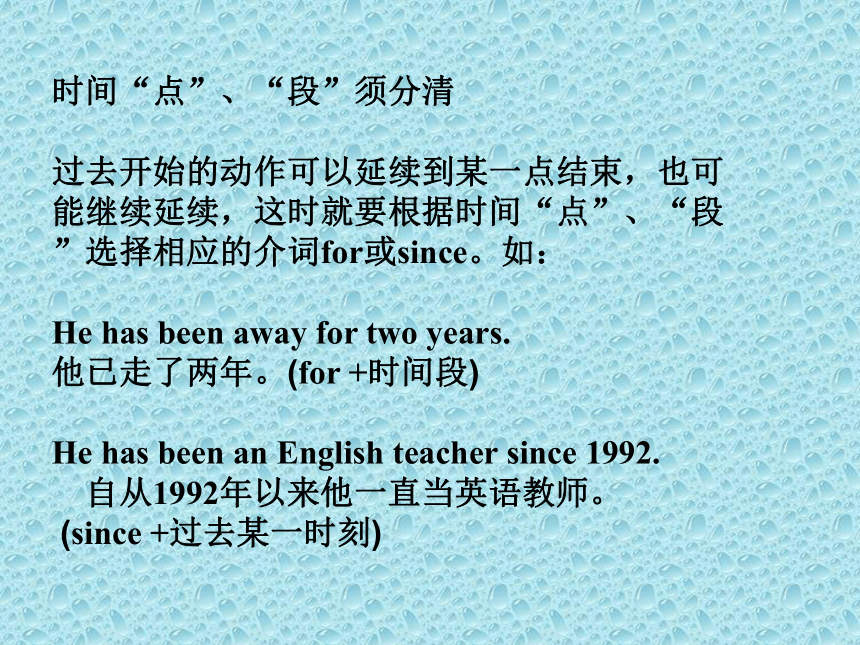
文档简介
(共30张PPT)
现在完成时态
present perfect
现在完成时:
表示过去发生或已经完成的某一动作对现在造成的影响或结果,或从过去开始一直延续到现在的动作或保存的状态。
结构: 主语+ have / has + 动词的过去分词
一般疑问句: have / has …
Yes, I have. No, I haven’t.
Yes, she has. No, she hasn’t.
1. 现在完成时动词构成
have /has + v 过去分词
助动词
否定
haven’t
hasn’t
疑问
Have you…
Has he…
常与下列时间状语连用:just , already, yet,
ever, never, before, several times
现在完成时基本结构:
主语+have/has+动词的过去分词(p.p)
①肯定句: 主语+have/has+动词的过去分词(p.p)(V-ed)+宾语(或者其他).
②否定句: 主语+have not/has not+动词的过去分词(p.p)(V-ed)+宾语.
③一般疑问句: Have/Has+主语+动词的过去分词(p.p)(V-ed)+宾语(或者其他)
④特殊疑问句: 特殊疑问词+一般疑问句(have/has+主语+过去分词+其他)
现在完成时
1.过去发生的动作对现在造成的影响或结果。和already,never,ever,just,before,yet等状语连用。
2.过去已经开始,持续到现在的动作或状态,
常与for或since引起的一段时间状语连用。
动词构成:have/has+v过去分词
have breakfast
I have just had my breakfast.
(现在我不饿)
I’m not hungry now
moved here
in 2004
I still live here
I have lived here for three years.
I have lived here since 2004/three years ago.
now
past
现在完成时的含义之一是过去完成的动作
对现在仍有影响,用以下四大标志词可以
表达这种含义:
一:以already, just和yet为标志
already, just和yet表示到现在为止动作或状态已经 、刚刚或还没有发生。
He has already got her help. 他已得到她的帮助。
He has just seen the film. 他刚刚看过这场电影。
He hasn’t come back yet. 他还没有回来。
二:以ever和never为标志
ever和never表示到现在为止动作或状态曾经或从来没有发生过。
This is the best film I have ever seen.
这是我曾经看过的最好的一部电影。
He has never been to Beijing.
他从没有到过北京。
三:以动作发生的次数为标志
若某一动作到现在为止已经发生了若干次,
则要使用现在完成时。
He says he has been to the USA three times.
他说他已经去过美国三次了。
四:以so far为标志
so far往往表示到目前为止动作或状态已经发生。
He has got to Beijing so far.
到目前为止他已到了北京。
She has passed the exam so far.
到目前为止她已经通过了考试。
过去已经开始的动作一直延续到现在,甚至有可能继续延续下去,我们可以从动作“延续”的特性和“时间”点段的区分入手,进一步学习现在完成时。
“终止”、“延续”要转换
英语中的动词从词义上可以分为延续性和非延续性两种。在现在完成时态中一定要注意动词这一特性,应将这类非延续性动词转换为延续性动词。如:
“Cats” has been on for half an hour. 《猫》已经开演半个小时了。
How long have you had this dictionary 这本字典你买了多久了
初中阶段常见的有:come—be, go out—be out, leave—be away (from), begin—be on, buy—have, borrow—keep, join—be a member / 介词短语, die—be dead, become—be, open (v.)—be open (adj.) 等。
时间“点”、“段”须分清
过去开始的动作可以延续到某一点结束,也可能继续延续,这时就要根据时间“点”、“段”选择相应的介词for或since。如:
He has been away for two years.
他已走了两年。(for +时间段)
He has been an English teacher since 1992.
自从1992年以来他一直当英语教师。
(since +过去某一时刻)
2. 现在完成时动词可以表示开始于过去持续
到现在(也许还会继续进行下去)的动作或状态。
1) I have studied English since last year.
我从去年开始学习英语。
2) She has lived in Beijing for five years.
她住在北京已经五年了。
注意: come, go , leave, arrive, buy, lose, receive, join,
die和marry 等动词所表示的动作是一时的, 不能延续
的, 故不能与for …, since …等开头的表示一段时间的
状语连用。
不能说:
*She has come to Shanghai for two years.
*She has bought that book for three weeks.
*Her grandpa has died for nine months.
可以说:
She has been in Shanghai for two years.
She has had that book for three weeks.
Her grandpa has been dead for nine months.
或者说:
It is two years since she came to Shanghai.
It is three weeks since she bought that book.
It is nine months since her grandpa died.
现在完成时:表示过去发生或已经完成的某一动作对现在造成的影响或结果,或从过去开始一直延续到现在的动作或保存的状态,强调的是现在的情况,不能和表示过去的时间状语连用(如:in 1990,last Sunday 等)。
一般过去时:一般过去时只表示过去的动作或状态,和现在不发生关系(即动作或状态在现在已经结束),它可以和表示过去的时间状语连用。
3. 现在完成时与一般过去时的区别:
have / has + V过去分词
现在完成时把过去的动作和现在的结果联系起来,
一般过去时只限于表示过去的动作本身, 与现在
的结果无关。现在完成时与一般过去时在意义上
的区别举例如下:
I have cleaned my room. (My room is clean now.)
我已经打扫过我的房间了。
I cleaned my room last week. (I did it in the past.)
我上周打扫了我的房间。
Father has gone to Shanghai. (He went to Shanghai
and he is not here now.) 爸爸已经去上海了。
They have bought a dictionary. (They bought
a dictionary and they have it now.)
他们买了一本字典。
( 1).for+表示一段时间的短语
( 2).since+表示过去时间点的词语
( 3).since+表示过去时间的时间状语从句
eg.I have been a teacher ______ a year.
He has been at this school _______ 1992.
We have learned 1,000 English words _______ we came to this school.
for
since
since
现在完成时句中常见的时间状语
A.表示从过去一直持续到现在, 不能是具体
的过去时间。
ever
just
already
yet
e.g. Have you _____been to Japan
I have _____ finished my homework.
I have finished my homework ______.
I haven’t finished my homework ____.
B. just, already, yet, before/ ever, never有此
类副词时,常强调动作完成,不强调动作的持续.
already “已经” ; yet “仍然, 还”
这两个副词常常用于完成时态, 其中already
常用于肯定句, yet常用于否定句和疑问句中。
如: Jim has already finished his work.
Jim已经把他的工作做完了。
Mother hasn’t come home yet. 妈妈还没回来。
Haven’t you read The Call of the Wild yet
你还没读过《野性的呼唤》吗?
She has already finished her work.
她已经把工作做完了。
I haven’t read the story yet. 我还没读过这个故事。
Have you met him before 你从前曾见过他吗?
Lily has always been a good student.
Lily一直是个好学生。
比较:
I have seen him this morning .
我上午看见他了。(说话时在上午)
I saw him this morning.
今天上午我遇见了他。(说话时可能是下午或者晚上)
It has been cold this winter.
今天冬天一直很冷。(说话时仍是冬天)
I have read the book before.
我之前读过这本书.(我了解这本书的内容.)
I read the book last year.
我去年读的这本书.(读的动作已经过去.)
He has lived in the house since 1990.
(强调对现在的影响,现在仍然住在这儿.)
He lived in the house in 1990.
(强调居住动作发生过了,不涉及现在的情况.)
改写句子
1.My father came back from the bookshop just now.
My father ______ just ________ ______ the book shop.
2.He began to learn Chinese in 2001.
He _____ _______ Chinese since 2001.
3.The film began two minutes ago.
The film _____ ______ ______ since two minutes ago.
4.He has had the motorbike for two years.
It’s two years ______he ________ the motorbike.
He ________ the motorbike two years ______.
Two years ______ ______ since he ______ the motor
bike.
has
returned
from
has
learned
has been on
since
bought
bought
ago
has passed
bought
1. I ________heard of that story before.
A. don’t have B. not have C. have not D. not to have
2. She’ s never been to that factory,_________
A. is she B. was she C. does she D. has she
3. Have you made dumplings__________ No, I haven’t.
A. just now B. yesterday C. ago D. before
4. Tom________ ill since last night.
A. was B. is C. has been D. be
5. How long have you_ ________ Nanjing
A. gone to B. been to C .been in D. went to
C
D
D
C
C
一 同义句
6. How many times has Jim _______that park Twice.
A. gone to B. been to C. been in D. went to
7. I’ve______ this dictionary for half a year.
A. bought B. had C. lended D. borrowed
8. She won’t go to the cinema this evening because she
________the film before.
A. has seen B. saw C. sees D. is seeing
B
B
A
1. 她成为一名护士已经三年了。
2. 我五年前就认识李雷了。
3. 那些相片我已经寄给他了。(post)
4. 我来到这个学校后,他就一直教我。
5. 我刚丢了我的历史书。
She has been a nurse for three years.
I have known Lilei since five years ago.
I have already posted the photos to him.
He has taught me since I came to the school.
I have just lost my history book.
二 翻译
1.I borrowed the library book two days ago.
I _______ _______the library book________ two days.
2.The meeting started ten minutes ago.
A. The meeting________ _________ _________ _________ten minutes ago.
B. The meeting________ _________ ___________ ________ten minutes.
have kept
for
has been on
has been on
since
for
三 同义句
3.My brother joined the Party last year.
A. My brother _________ _________ ________the Party since last year.
B. My brother__________ ________ _______ party member since last year.
4.He left Nanjing two years ago.
He_________ _________ ________ ________
Nanjing for two years.
has been
in
has been a
has been away from
5. That dog died last month.
That dog_______ ________ ________since last month.
6. He has had the bike for two years.
A. Two years______ _______since he ________the bike.
B. It’s ______ __________since he_________ the bike.
C. He _______the bike two years__________.
has been dead
has passed
bought
two years bought
bought ago
现在完成时态
present perfect
现在完成时:
表示过去发生或已经完成的某一动作对现在造成的影响或结果,或从过去开始一直延续到现在的动作或保存的状态。
结构: 主语+ have / has + 动词的过去分词
一般疑问句: have / has …
Yes, I have. No, I haven’t.
Yes, she has. No, she hasn’t.
1. 现在完成时动词构成
have /has + v 过去分词
助动词
否定
haven’t
hasn’t
疑问
Have you…
Has he…
常与下列时间状语连用:just , already, yet,
ever, never, before, several times
现在完成时基本结构:
主语+have/has+动词的过去分词(p.p)
①肯定句: 主语+have/has+动词的过去分词(p.p)(V-ed)+宾语(或者其他).
②否定句: 主语+have not/has not+动词的过去分词(p.p)(V-ed)+宾语.
③一般疑问句: Have/Has+主语+动词的过去分词(p.p)(V-ed)+宾语(或者其他)
④特殊疑问句: 特殊疑问词+一般疑问句(have/has+主语+过去分词+其他)
现在完成时
1.过去发生的动作对现在造成的影响或结果。和already,never,ever,just,before,yet等状语连用。
2.过去已经开始,持续到现在的动作或状态,
常与for或since引起的一段时间状语连用。
动词构成:have/has+v过去分词
have breakfast
I have just had my breakfast.
(现在我不饿)
I’m not hungry now
moved here
in 2004
I still live here
I have lived here for three years.
I have lived here since 2004/three years ago.
now
past
现在完成时的含义之一是过去完成的动作
对现在仍有影响,用以下四大标志词可以
表达这种含义:
一:以already, just和yet为标志
already, just和yet表示到现在为止动作或状态已经 、刚刚或还没有发生。
He has already got her help. 他已得到她的帮助。
He has just seen the film. 他刚刚看过这场电影。
He hasn’t come back yet. 他还没有回来。
二:以ever和never为标志
ever和never表示到现在为止动作或状态曾经或从来没有发生过。
This is the best film I have ever seen.
这是我曾经看过的最好的一部电影。
He has never been to Beijing.
他从没有到过北京。
三:以动作发生的次数为标志
若某一动作到现在为止已经发生了若干次,
则要使用现在完成时。
He says he has been to the USA three times.
他说他已经去过美国三次了。
四:以so far为标志
so far往往表示到目前为止动作或状态已经发生。
He has got to Beijing so far.
到目前为止他已到了北京。
She has passed the exam so far.
到目前为止她已经通过了考试。
过去已经开始的动作一直延续到现在,甚至有可能继续延续下去,我们可以从动作“延续”的特性和“时间”点段的区分入手,进一步学习现在完成时。
“终止”、“延续”要转换
英语中的动词从词义上可以分为延续性和非延续性两种。在现在完成时态中一定要注意动词这一特性,应将这类非延续性动词转换为延续性动词。如:
“Cats” has been on for half an hour. 《猫》已经开演半个小时了。
How long have you had this dictionary 这本字典你买了多久了
初中阶段常见的有:come—be, go out—be out, leave—be away (from), begin—be on, buy—have, borrow—keep, join—be a member / 介词短语, die—be dead, become—be, open (v.)—be open (adj.) 等。
时间“点”、“段”须分清
过去开始的动作可以延续到某一点结束,也可能继续延续,这时就要根据时间“点”、“段”选择相应的介词for或since。如:
He has been away for two years.
他已走了两年。(for +时间段)
He has been an English teacher since 1992.
自从1992年以来他一直当英语教师。
(since +过去某一时刻)
2. 现在完成时动词可以表示开始于过去持续
到现在(也许还会继续进行下去)的动作或状态。
1) I have studied English since last year.
我从去年开始学习英语。
2) She has lived in Beijing for five years.
她住在北京已经五年了。
注意: come, go , leave, arrive, buy, lose, receive, join,
die和marry 等动词所表示的动作是一时的, 不能延续
的, 故不能与for …, since …等开头的表示一段时间的
状语连用。
不能说:
*She has come to Shanghai for two years.
*She has bought that book for three weeks.
*Her grandpa has died for nine months.
可以说:
She has been in Shanghai for two years.
She has had that book for three weeks.
Her grandpa has been dead for nine months.
或者说:
It is two years since she came to Shanghai.
It is three weeks since she bought that book.
It is nine months since her grandpa died.
现在完成时:表示过去发生或已经完成的某一动作对现在造成的影响或结果,或从过去开始一直延续到现在的动作或保存的状态,强调的是现在的情况,不能和表示过去的时间状语连用(如:in 1990,last Sunday 等)。
一般过去时:一般过去时只表示过去的动作或状态,和现在不发生关系(即动作或状态在现在已经结束),它可以和表示过去的时间状语连用。
3. 现在完成时与一般过去时的区别:
have / has + V过去分词
现在完成时把过去的动作和现在的结果联系起来,
一般过去时只限于表示过去的动作本身, 与现在
的结果无关。现在完成时与一般过去时在意义上
的区别举例如下:
I have cleaned my room. (My room is clean now.)
我已经打扫过我的房间了。
I cleaned my room last week. (I did it in the past.)
我上周打扫了我的房间。
Father has gone to Shanghai. (He went to Shanghai
and he is not here now.) 爸爸已经去上海了。
They have bought a dictionary. (They bought
a dictionary and they have it now.)
他们买了一本字典。
( 1).for+表示一段时间的短语
( 2).since+表示过去时间点的词语
( 3).since+表示过去时间的时间状语从句
eg.I have been a teacher ______ a year.
He has been at this school _______ 1992.
We have learned 1,000 English words _______ we came to this school.
for
since
since
现在完成时句中常见的时间状语
A.表示从过去一直持续到现在, 不能是具体
的过去时间。
ever
just
already
yet
e.g. Have you _____been to Japan
I have _____ finished my homework.
I have finished my homework ______.
I haven’t finished my homework ____.
B. just, already, yet, before/ ever, never有此
类副词时,常强调动作完成,不强调动作的持续.
already “已经” ; yet “仍然, 还”
这两个副词常常用于完成时态, 其中already
常用于肯定句, yet常用于否定句和疑问句中。
如: Jim has already finished his work.
Jim已经把他的工作做完了。
Mother hasn’t come home yet. 妈妈还没回来。
Haven’t you read The Call of the Wild yet
你还没读过《野性的呼唤》吗?
She has already finished her work.
她已经把工作做完了。
I haven’t read the story yet. 我还没读过这个故事。
Have you met him before 你从前曾见过他吗?
Lily has always been a good student.
Lily一直是个好学生。
比较:
I have seen him this morning .
我上午看见他了。(说话时在上午)
I saw him this morning.
今天上午我遇见了他。(说话时可能是下午或者晚上)
It has been cold this winter.
今天冬天一直很冷。(说话时仍是冬天)
I have read the book before.
我之前读过这本书.(我了解这本书的内容.)
I read the book last year.
我去年读的这本书.(读的动作已经过去.)
He has lived in the house since 1990.
(强调对现在的影响,现在仍然住在这儿.)
He lived in the house in 1990.
(强调居住动作发生过了,不涉及现在的情况.)
改写句子
1.My father came back from the bookshop just now.
My father ______ just ________ ______ the book shop.
2.He began to learn Chinese in 2001.
He _____ _______ Chinese since 2001.
3.The film began two minutes ago.
The film _____ ______ ______ since two minutes ago.
4.He has had the motorbike for two years.
It’s two years ______he ________ the motorbike.
He ________ the motorbike two years ______.
Two years ______ ______ since he ______ the motor
bike.
has
returned
from
has
learned
has been on
since
bought
bought
ago
has passed
bought
1. I ________heard of that story before.
A. don’t have B. not have C. have not D. not to have
2. She’ s never been to that factory,_________
A. is she B. was she C. does she D. has she
3. Have you made dumplings__________ No, I haven’t.
A. just now B. yesterday C. ago D. before
4. Tom________ ill since last night.
A. was B. is C. has been D. be
5. How long have you_ ________ Nanjing
A. gone to B. been to C .been in D. went to
C
D
D
C
C
一 同义句
6. How many times has Jim _______that park Twice.
A. gone to B. been to C. been in D. went to
7. I’ve______ this dictionary for half a year.
A. bought B. had C. lended D. borrowed
8. She won’t go to the cinema this evening because she
________the film before.
A. has seen B. saw C. sees D. is seeing
B
B
A
1. 她成为一名护士已经三年了。
2. 我五年前就认识李雷了。
3. 那些相片我已经寄给他了。(post)
4. 我来到这个学校后,他就一直教我。
5. 我刚丢了我的历史书。
She has been a nurse for three years.
I have known Lilei since five years ago.
I have already posted the photos to him.
He has taught me since I came to the school.
I have just lost my history book.
二 翻译
1.I borrowed the library book two days ago.
I _______ _______the library book________ two days.
2.The meeting started ten minutes ago.
A. The meeting________ _________ _________ _________ten minutes ago.
B. The meeting________ _________ ___________ ________ten minutes.
have kept
for
has been on
has been on
since
for
三 同义句
3.My brother joined the Party last year.
A. My brother _________ _________ ________the Party since last year.
B. My brother__________ ________ _______ party member since last year.
4.He left Nanjing two years ago.
He_________ _________ ________ ________
Nanjing for two years.
has been
in
has been a
has been away from
5. That dog died last month.
That dog_______ ________ ________since last month.
6. He has had the bike for two years.
A. Two years______ _______since he ________the bike.
B. It’s ______ __________since he_________ the bike.
C. He _______the bike two years__________.
has been dead
has passed
bought
two years bought
bought ago
同课章节目录
- Unit 1 What's the matter?
- Section A
- Section B
- Unit 2 I'll help to clean up the city parks.
- Section A
- Section B
- Unit 3 Could you please clean your room?
- Section A
- Section B
- Unit 4 Why don't you talk to your parents?
- Section A
- Section B
- Unit 5 What were you doing when the rainstorm came
- Section A
- Section B
- Review of Units 1-5
- Unit 6 An old man tried to move the mountains.
- Section A
- Section B
- Unit 7 What's the highest mountain in the world?
- Section A
- Section B
- Unit 8 Have you read Treasure Island yet?
- Section A
- Section B
- Unit 9 Have you ever been to a museum?
- Section A
- Section B
- Unit 10 I've had this bike for three years.
- Section A
- Section B
